
Filter News
Area of Research
- Advanced Manufacturing (6)
- Biology and Environment (22)
- Computational Biology (1)
- Computational Engineering (2)
- Computer Science (8)
- Electricity and Smart Grid (1)
- Energy Science (69)
- Fusion and Fission (13)
- Fusion Energy (9)
- Isotope Development and Production (1)
- Isotopes (4)
- Materials (79)
- Materials Characterization (1)
- Materials for Computing (13)
- Materials Under Extremes (1)
- National Security (15)
- Neutron Science (68)
- Nuclear Science and Technology (12)
- Quantum information Science (1)
- Sensors and Controls (2)
- Supercomputing (36)
- Transportation Systems (2)
News Type
News Topics
- (-) Artificial Intelligence (51)
- (-) Biomedical (28)
- (-) Fusion (27)
- (-) Grid (38)
- (-) Materials Science (90)
- (-) Neutron Science (81)
- (-) Security (13)
- (-) Space Exploration (13)
- 3-D Printing/Advanced Manufacturing (83)
- Advanced Reactors (25)
- Big Data (25)
- Bioenergy (42)
- Biology (47)
- Biotechnology (14)
- Buildings (36)
- Chemical Sciences (48)
- Clean Water (16)
- Composites (23)
- Computer Science (105)
- Coronavirus (28)
- Critical Materials (23)
- Cybersecurity (20)
- Education (3)
- Element Discovery (1)
- Emergency (1)
- Energy Storage (75)
- Environment (86)
- Exascale Computing (14)
- Fossil Energy (2)
- Frontier (17)
- High-Performance Computing (44)
- Hydropower (6)
- Irradiation (2)
- Isotopes (25)
- ITER (5)
- Machine Learning (27)
- Materials (96)
- Mathematics (3)
- Mercury (5)
- Microelectronics (1)
- Microscopy (28)
- Molten Salt (8)
- Nanotechnology (41)
- National Security (21)
- Nuclear Energy (47)
- Partnerships (33)
- Physics (30)
- Polymers (23)
- Quantum Computing (18)
- Quantum Science (43)
- Simulation (19)
- Statistics (2)
- Summit (30)
- Transportation (62)
Media Contacts

A new method developed at Oak Ridge National Laboratory improves the energy efficiency of a desalination process known as solar-thermal evaporation.
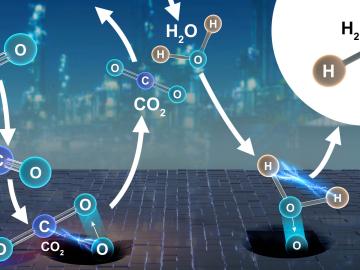
Collaborators at the Department of Energy’s Oak Ridge National Laboratory and U.S. universities used neutron scattering and other advanced characterization techniques to study how a prominent catalyst enables the “water-gas shift” reaction to purify and generate hydrogen at industrial scale.
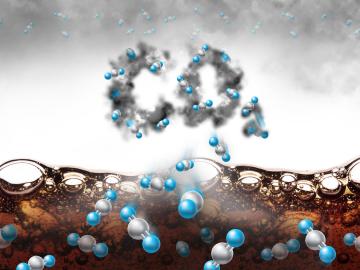
Oak Ridge National Laboratory has teamed with Cornell College and the University of Tennessee to study ways to repurpose waste soft drinks for carbon capture that could help cut carbon dioxide emissions.

Scientists at Oak Ridge National Laboratory studying quantum communications have discovered a more practical way to share secret messages among three parties, which could ultimately lead to better cybersecurity for the electric grid

Researchers at Oak Ridge National Laboratory are taking inspiration from neural networks to create computers that mimic the human brain—a quickly growing field known as neuromorphic computing.
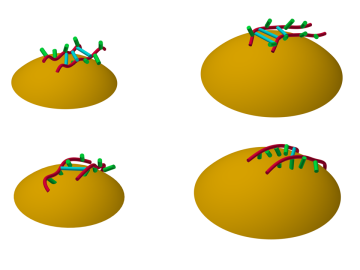
A team of researchers at Oak Ridge National Laboratory have demonstrated that designed synthetic polymers can serve as a high-performance binding material for next-generation lithium-ion batteries.

Researchers have pioneered a new technique using pressure to manipulate magnetism in thin film materials used to enhance performance in electronic devices.

A study led by Oak Ridge National Laboratory explored the interface between the Department of Veterans Affairs’ healthcare data system and the data itself to detect the likelihood of errors and designed an auto-surveillance tool
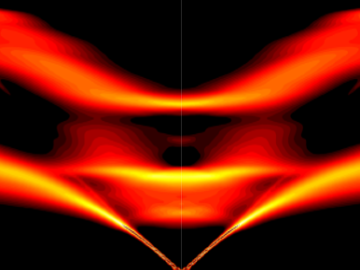
Scientists have discovered a way to alter heat transport in thermoelectric materials, a finding that may ultimately improve energy efficiency as the materials
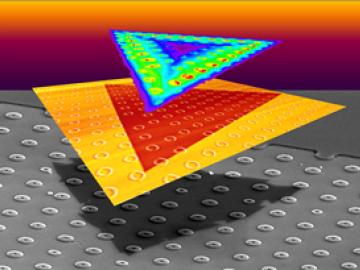
A team led by scientists at the Department of Energy’s Oak Ridge National Laboratory explored how atomically thin two-dimensional (2D) crystals can grow over 3D objects and how the curvature of those objects can stretch and strain the


